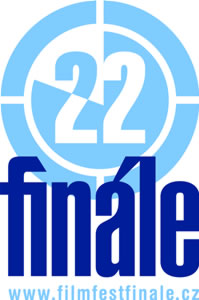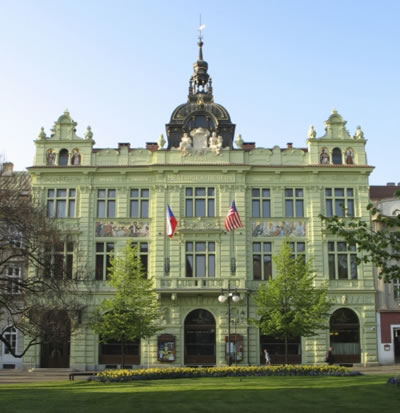Finále Plzeň Festival of Czech Films
Written by: FFT Webmaster | April 19th, 2009

You may not know Pilsen, but any beer connoisseur can guess from its name that the Czech town is a source of ferment. Pilsner Urquell calls it home, as does the annual festival of Czech films, Finále Plzeň, which runs April 19–25.
The festival dates back to 1968, when the Communist Party allowed a “Spring” thaw. Finále Plzeň sought to acquaint Czechs with their own New Wave of films sweeping world festivals, but three years later packed itself on ice as Czech cinema ran afoul of “Normalization.” Revived in 1990 following Velvet Revolution, it has since showcased domestic fare produced from April to April of each year.
As befits a place with an active brewery and Beer Museum, its film festival mixes new releases alongside dusty gems. How does the present reflect the past and visa-versa? Pilsen brings together filmmakers and films across generations and rolls out the funhouse mirror.
Its 22nd edition screens 150 titles, including 12 fiction features in competition for the coveted Golden Kingfisher award. Changes (Proměny) opens the revelries in the big hall at Měšťanská beseda. The feature debut by Tomáš Řehořek arrives amid mounting ado, says festival executive director Pavla Kormošová, both about the director’s tender age of 21 and about the film’s European sensibility. Ironically, the success of the Czech New Wave left a legacy of talky, discursive work lacking the pulse of a more voluptuous cinema, and word is Changes swerves from what self-deprecatory Czechs see as a national filmic rut.
Like Changes, Guard No. 47 (Hlídač č. 47) comes with whiff of excitement, having bagged four prizes and rubbed shoulders with George Lucas at Northern California’s Tiburon festival. Filip Renč’s story of a railway guard who feigns deafness to sleuth out his wife’s infidelity picked up three Czech Lions, the Czech Republic’s version of the Oscars.

Václav Marhoul’s WWII drama, Tobruk, and Michaela Pavlátová‘s coming-of-ager Night Owls (Děti noci) are two other Czech Lion winners in the joust. One that conspicuously is not, Juraj Jakubisko’s fantasy gorefest, Bathory, holds the distinction of being the costliest Czech or Slovak production ever, at roughly 300 million crowns (US $20 million). How these movies may fare at Pilsen is anyone’s guess.
“Very often the juries at Pilsen have selected different films from those awarded elsewhere,” says Pavel Jech, Dean of Prague film academy FAMU and 2009 Golden Kingfisher jurist. Case in point: Jan Sverák‘s Kolya (Kolja) walked away from the 1997 Academy Awards with a statue, but only earned audience trinkets at Pilsen. Or take Petr Zelenka’s faux documentary, Year of the Devil (Rok ďábla), which won Grand Prize the 2002 Karlovy Vary International Film Festival—the country’s premiere festival—and 11 Czech Lions, while settling for minor kudos at Pilsen. Autumn Spring (Babí léto), by Vladimír Michálek, netted Pilsen’s Golden Kingfisher that year. As Jech puts it, the forum “provides another way of celebrating films that have been overlooked.”
Which brings us back to its fling with history. This year, Pilsen‘s review of the Sixties—”Czech cinema’s most turbulent decade”—takes 1969 as its focus. Festival-goers will also sample forgotten films of 1990s vintage as well as titles from such “cranks” as Karel Kachyňa, Juraj Herz, Milan Kundera and Jan Švankmajer. And retrospective tributes are planned for two iconic Czech directors, Věra Chytilová and František Vláčil. The former may be known to American arthouse patrons for her prankish 60s romp, Daisies (Sedmikrásky) while the latter’s epic masterpiece, Marketa Lazarová—considered by Czechs the nation’s greatest work—awaits discovery on these shores some four decades after its making.
If raiding film archives is a festival tradition, Czech filmmakers plumbing early literature rides a more recent vogue. Two current titles look to 19th-century Czech literature for inspiration. Goat Story–The Old Prague Legends (Kozí příběh–Pověsti staré Prahy), is being hailed as the first 3D animated feature film in a country famous for its stop motion animation. Not only is Jan Tománe‘s comedic take on the hoary tale fueling chatter, but the Czech cuisine and goats planned for its party have tongues wagging as well. Nostalgia also surfaces in František A. Brabec‘s period drama May (Máj), drawn from the lyrical epic poem Karel Hynek Mácha penned in 1836. Taken together with Guard No. 47 (based on Josef Kopta’s 1926 novel), Tobruk (inspired by The Red Badge of Courage) and Bathory (a reworking of the legends surrounding the titular Renaissance countess), time-travel is arguably a mini-trend on the Czech screen.
With noted exceptions like Jan Hřebejk’s 1999 Cosy Dens (Pelíšky) and 2000 Divided We Fall (Musíme si pomáhat), set around Prague Spring and the German occupation, respectively, looking back hasn’t been big in a country where it’s often been more comfortable not to. (No surprise that contemporary comedies account for half of Pilsen’s fiction slate.) Yet as computer technology eases the filmmaker’s scrape with history and fantasy, perhaps more Czech filmmakers will be emboldened to stir up the past.
In the documentary category, where commercial stakes aren’t as high, yesterday is more apt to crop up. This year, 24 new Czech non-fictions vie for trophies, selected from 62 submissions, while 10 are presented with no eye on a prize. One award contestant, Helena Třeštíková’s René, chronicles two decades in the life of a repeat offender. Among its many garlands is the European Film Academy’s prestigious Prix Arte, a first for a Czech film.
As with fiction work, high tech toys are nudging the limits of documentary expression. But whatever technology’s impact, FAMU’s Jech traces an evolutionary twist in the art form to his own institution. In 2002, filmmaker and “moral guru” Karel Vachek became head of documentary development at FAMU. The upshot, according to Jech, is a phalanx of young disciples who foreground moral issues, “often at the expense of form.”
 The merits of this approach join the likely topics of debate at forums ranging from discussions and talk shows to exhibits and concerts. Relaxed exchange is a guiding philosophy at what Pilsen’s Kormošová likes to call a “workshop festival.” She explains, “We’re not about red carpets—though we have that too—but we’re very friendly, open and non-hectic…so Czech filmmakers have a chance to get together with other filmmakers and industry people from other countries, not just with the audience.”
The merits of this approach join the likely topics of debate at forums ranging from discussions and talk shows to exhibits and concerts. Relaxed exchange is a guiding philosophy at what Pilsen’s Kormošová likes to call a “workshop festival.” She explains, “We’re not about red carpets—though we have that too—but we’re very friendly, open and non-hectic…so Czech filmmakers have a chance to get together with other filmmakers and industry people from other countries, not just with the audience.”
Who says swapping ideas went out with the 60s? Happily, traditions die hard at Finále Plzeň.
FILMS BY SECTIONS
New Czech fiction features – In Competition
Marbles / Kuličky / Olga Dabrowská
I´m All Good / U mě dobrý / Jan Hřebejk
Bathory / Bathory /Juraj Jakubisko
May / Máj / František A. Brabec
Tobruk / Tobruk / Václav Marhoul
Night Owls / Děti noci / Michaela Pavlátová
English Strawberries / Anglické jahody / Vladimír Drha
Guard No. 47 / Hlídač č. 47 / Filip Renč
Who Is Afraid of the Wolf / Kdopak by se vlka bál / Maria Procházková
Sister / Sestra / Vít Pancíř
Wingless / Ocas ještěrky / Ivo Trajkov
El Paso / El Paso / Zdeněk Tyc
New Czech Fiction Features – Out of Competition
Smutek paní Šnajderové / Sorrow of Mme Schneider / Piro Milkani, Eno Milkani
František je děvkař / František is a Womanizer /Jan Prušinovský
Nestyda / Shameless /Jan Hřebejk
Kozí příběh – Pověsti staré Prahy / Goat Story – The Old Prague Legends / Jan Tománek
Malé oslavy / Small Celebrations / Zdeněk Tyc
Vy nám taky, šéfe! / Same to You, Boss! / Martin Kotík
Sněženky a machři po 25 letech / Thawing Out / Viktor Tauš
Peklo s princeznou / Hell with the Princess / Miloslav Šmídmajer
New Czech Documentary Films – In Competition
20 ran / 20 Shots / Jaroslav Kratochvíl
Anatomie Gagu / Anatomy of a Gag / Josef Abrhám Jr.
Argippo znovuzrozený / Argippo Resurrected / Dan Krameš
Bimba – příběh zapomenutého malíře / Bimba – The Story of a Forgetten Painter / Ladislav Moulis
Česká Republika / Rapublic / Pavel Abrahám
Ghetto jménem Baluty / A Ghetto Named Baluty / Pavel Štingl
Gyumri / Gyumri / Jana Ševčíková
Heroes/Das Koncept / Heroes/Das Koncept / Petr Hátle
Hodně žen i hodně mužů / Many Women and Many Men / Tomáš Weinreb
Ivetka a hora / Ivetka and the Mountain / Vít Janeček
Ježíš je normální! / Také it Jeasy! / Tereza Nvotová
O domě / About the House / Bohdan Bláhovec
Okno oko srdce, do oka okno, duše / Window an Eye of Heart, into an Eye Window of, a Soul / Dominik Krutský
Oni, my a Skitskoj /dialog ve střižně/ / Them, Us and Skitskoj /A Dialogue in the Editing Room/, r. Zdeněk N. Bričkovský
Ovoce samo padající / Fruit Falling of Itself / Petr Záruba
Pokus o duchovní nápravu opraváře televizí Josefa Lávičky v devíti obrazech / Redemption Attempt of a TV Repairman Josef Lávička in Nine Scenes Lukáš Kokeš
Přítomný okamžik / Present Moment / Jan Šípek
René / René / Helena Třeštíková
Trvalé bydliště Praha / Permanent Residence Prague / Ivo Bystřičan
Velmistr / Grandmaster / Rozálie Kohoutová
Zajatci bílého boha / Prisoners of a White God / Steve Lichtag
Zapomenuté transporty do Estonska / Forgotten Transports to Estonia / Lukáš Přibyl
Zážitky na prodej / Experiences for Sale / Tereza Reichová
Zpověď Kateryny K. / The Confessions of Kateryna K. / Miroslav Janek
New Czech Documentary Films – Out of Competition
Auschwitz – Birkenau, Nummer 168830, vězeň Oldřich Stránský / Auschwitz – Birkenau, Number 168830, prisoner Oldřich Stránský / Oliver Malina Morgenstern
Do země (ne)zaslíbené / Into the land of (no)promise / David Vondráček
Já v množném čísle / Me – plural / Jan Gogola
Le Mans Phenomenon / Le Mans Phenomenon / Adolf Zika
Léčivo / Medicaments / Tereza Reichová
Moji milovaní / My embrace / Alena Derzsiová
Můj děda byl voják, válčil na Piavě / My grandpa Was a Soldier, He Made War at Piava / Jan Novák
Pamět´ Českého lesa / Memory of Český les / Miroslav Anton
Sedm světel / Seven Lights / Olga Sommerová
Život bez škatulky / Life without Pigeon-hole / Theodora Remundová
Those Wonderful Movie Cranks
Boxer a smrť / The Boxer and Death / jubilees: Peter Solan
Straka v hrsti / The Magpie in the Wisp / jubilees: Juraj Herz
Žert / The Joke / jubilees: Milan Kundera, Josef Somr, Věra Křesadlová
Mučedníci lásky / Martyrs of Love / jubilees: Jan Klusák
Místenka bez návratu / One-Way Ticket / jubilees: Dušan Klein, Vladimír Körner
Sladké hořkosti Lídy Baarové / Sweet bitterness of Lída Baarová / jubilees: Helena Třeštíková
Sladké století / Sweet century / jubilees: Helena Třeštíková
O čem sní muži / What Man Dreams About / jubilees: Olga Sommerová
S tebou, táto / With You, Dad / jubilees: Olga Sommerová
Nachové plachty / Scarlet Sails / jubilees: Miroslav Janek
Children’s screenings – Those Wonderful Movie Cranks
Osada Havranů / Settlement of Crows / jubilees: Jan Schmidt
Na veliké řece / At Big River / jubilees: Jan Schmidt
Volání rodu / Calling the Clan / jubilees: Jan Schmidt
Open air screenings – Those Wonderful Movie Cranks
Ecce homo Homolka / Behold Homolka / jubilees: Jaroslav Papoušek, Petr a Matěj Formanovi
Hogo fogo Homolka / Polite Homolka / jubilees:Jaroslav Papoušek, Petr a Matěj Formanovi
Homolka a tobolka / Homolka and Pocket Book / jubilees: Jaroslav Papoušek, Petr a Matěj Formanovi
Jak svět přichází o básníky / How the World Is Loosing Poets / jubilees: Dušan Klein
Jak básníci přicházejí o iluze / How Poets Are Losing Their Illusions / jubilees: Dušan Klein
Jak básníkům chutná život / How Poets Are Enjoying Their Lives / jubilees: Dušan Klein
Konec básníků v Čechách / The end of the Poets in Bohemia / jubilees: Dušan Klein
Tribute to Věra Chytilová:
Sedmikrásky / Daisies
Hra o jablko / The Apple Game
Panelstory aneb Jak se rodí sídliště / Story from a Housing Estate
Kalamita / Calamity
Vzlety a pády / Flights and Falls
Tribute to František Vláčil:
Marketa Lazarová / Marketa Lazarová
Údolí včel / Valley of the Bees
Adelheid / Adelheid
Stíny horkého léta / Shadows of a Hot Summer
Koncert na konci léta / Concert at the End of Summer
MÁG. / MÁG.
The Year 1969
Flirt se slečnou Stříbrnou / Miss Silver’s Past / Václav Gajer
Panenství a kriminál /Virginity and Jail / Václav Lohniský
Případ pro začínajícího kata / A Case for a Young Hangman / Pavel Juráček
Smuteční slavnost / Funeral Ceremony / Zdeněk Sirový – Gajer
Směšný pán / Funny Man / Karel Kachyňa
Intruders
Jan 69 / Jan 69 / Stanislav Milota, Jaromír Kallista
Nezvaný host / The Uninvited Guest / Vlastimil Venclík
Les / Forest / Ivan Balaďa
Pasiáns / Solitaire / Jan Matějovský
Tryzna / Memorial Meeting / Vlado Kubenko, Peter Mihálik, Dušan Trančík
Šibenica / The Gallows-tree / Dušan Trančík
Ticho / Silence / Milan Peer
Zpráva o výzkumu veřejného mínění / The Report of the Public Opinion Research / Rudolf Granec
Hledání domova / Searching Home / Rudolf Krejčík
Ves / Village / Vladimír Drha
Jak se žije po okupantech / What Life is About After Intruders / Alena Činčerová
Polojasno / Somewhat Cloudy / Filip Renč
Silent Masterpieces of the ‘90s
Vojtěch, řečený sirotek / Vojtech, Called the Orphan / Zdeněk Tyc
Vracenky / Rebounds / Jan Schmidt
Marian / Marian / Petr Václav
Postel / The Bed / Oskar Reif
Agáta / Agata / Dan Krameš
Golden Sixties
Golden Sixties: Jan Švankmajer / Martin Šulík (together with the short Kostnice / Ossuary / Jan Švankmajer)
Golden Sixties: Ivan Passer / Martin Šulík (together with the short A Boring Agternoon / Ivan Passer)
Golden Sixties: Věra Chytilová (within the meeting with Věra Chytilová)
Chinese Film
Pošťák v Shangri-La / Postman in Shangri-La
Starý holič / The Old Barber
Dlouhá píseň / Long Tune
Nádech dívčích let / The Flavor of Girlhood
European Film
Volver / To Return / Pedro Almodóvar
Přestřelka v Palermu / Palermo Shooting / Wim Wenders
A tou nocí nevidím ani jednu hvězdu / And I Don´t See a Star That Night / Dagmar Knöpfel
Ukrutně šťastni / Terribly Happy / Henrik Ruben Genz
Herci / Actors / Bertrand Blier
Muzika / Juraj Nvota
Special Mention
Déšť / Rain / Slobodanka Radun – v rámci slavnostního zahájení / within the opening ceremonial
Proměny / Turnover / Tomáš Řehořek – v rámci slavnostního zahájení / within the opening ceremonial
Exponát roku 1827 / Exhibit of Year 1827 / Miroslav Gavelčík
Burianův den žen
O loupežníku Rumcajsovi 1,2 / Rumcais the Robber 1,2
O loupežnickém synku Cipískovi 1, 2, 3 / On Tiny, the Robber´s Sonny 1, 2, 3

